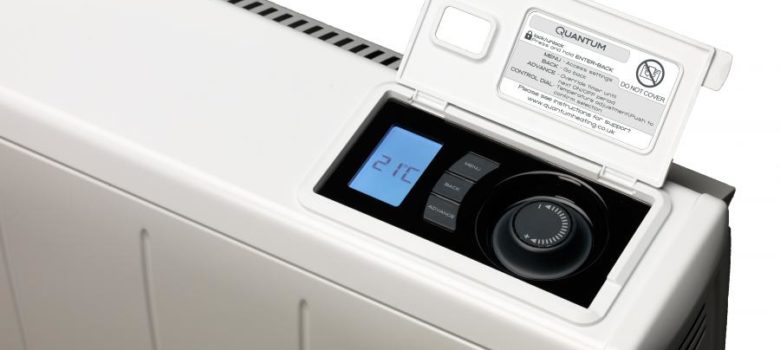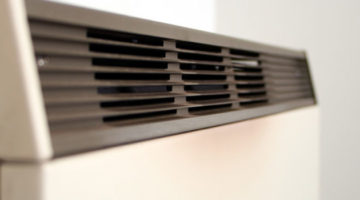
We recently visited Dimplex at their offices, where they talked us through some of their newest heating products. We started by hearing about why storage heaters were invented, why that need still exists, and what has changed with new technology.
In the 1960s, the UK needed to generate enough electricity overnight to power its huge number of factories. Coal and nuclear plants produced energy 24/7. When the industrial downturn came, there was a surplus of electricity being produced overnight, as not many appliances were run overnight. A way had to be found to use the electricity still being produced overnight and take the pressure off the grid in the daytime – hence storage heaters were invented.
Storage heaters are generally considered an outdated form of heating these days. Dimplex are very keen to change the perception of storage heaters as inefficient. They think their bad reputation is unfair, and it all comes down to them being wrongly installed/controlled/located – or, surprisingly regularly, used on the wrong tariff. They have designed their Quantum storage heater to be more efficient, better looking and easier to use.
So, what’s our take on the Dimplex Quantum storage heater?
Dimplex storage heater
Traditionally, one of the big problems with storage heaters is that, they tend to leak heat before you want to turn them on in the evening. This means that, at the coldest point in the day, there’s hardly any heat when you want it – despite the fact you charged them the night before. The guys at Dimplex think they have solved this, after lots of research. They have refined the insulation around the core, which now includes aerogel (an unrivalled insulator) and redesigned the heat brick (changing its materials, size and shape).
Another key development with this new generation of storage heater is that it is capable of monitoring weather forecasts (although there’s no real-time weather sensor). In theory this means that if a colder than normal day is expected, the heaters prepare for it in some way… It also monitors user patterns to promote comfort and efficiency. This means that the smart technology learns over time the different temperatures you like at various times of the day.
Dimplex have also redesigned the fan that dissipates heat from the brick into the room. Instead of the inefficient (and often noisy) fans in older models, this one is deliberately larger than needed, so it can run at half the speed and do the same job.
Dimplex realises that its key customer base for storage heaters is the elderly. It has been careful to develop special controls that are easy to use and tactile, with no fiddly knobs or tiny buttons. The digital control panel is clear and easy to use, which is a big leap from old-fashioned models.
There’s another definite advantage to Quantum heaters is that they look better! It would be hard to argue that bulky old storage heaters aren’t ugly – and they take up quite a bit of space too. Quantum heaters are slimline, and look pretty similar to normal radiators. Definitely an improvement!
BUT will there always be issues with storage heaters?
Dimplex say their tests have shown savings of 47% against electric radiators. However, the key here is that they are way more efficient than other storage heaters, or electric convection heaters – but the cost of electricity (per unit) is still far more higher than gas. You should only ever rely on storage heaters if you cannot get a gas supply fitted in your property. As well as being expensive to run, they are expensive to buy in the first place.
Although Dimplex have solved a lot of the problems historically associated with storage heaters, the Quantum will still only give out the amount of heating it has stored – or import it at 4 times the price of gas. Once you have used all the heating stored inside the brick, you have no option other than to use electricity straight from the grid at the more expensive daytime rate. This is why people with storage heaters find their bills much higher than expected. Quantum still only promises to provide 90% of the space heating in a room through overnight charging.
We have been wondering recently whether the end of coal power plants will signal the demise of the Economy 7 tariff. This would mean storage heaters would no longer be a economical heating option. We asked Dimplex about this, and whether their Quantum heaters could theoretically work with new time of use tariffs instead. They said the technology could be adapted to be smart enough to only charge at times in the day when electricity is at its cheapest. We weren’t entirely convinced the thought had crossed their mind before.
Although these storage heaters are easier to use than others, the technology could still be considered less than straightforward for some people. Any storage heaters will require a bit of planning to use efficiently. If you want fit and forget heating, storage heaters are not for you!
Should you buy Dimplex Quantum storage heaters?
Storage heaters have got a bad rep – and it’s true that the older ones had some serious downsides. But if you’re sure you want to stick with them, Quantum is without doubt the model to go to. It offers a higher level of control than alternatives, and is designed with ease of use at its centre. If you are off the gas-grid, an efficient modern storage heater such as the Dimplex Quantum is a good option – at least while Economy 7 is still going!
It’s worth mentioning, though, that storage heaters no longer have a monopoly on electrical heating. While fan-assisted electric convection heaters are pretty much the most expensive way to heat your home, there is a new alternative: infrared heating. Check it out!
Installing storage heaters
Need new storage heaters? We have scoured the country for the best tradespeople, so that we can make sure we only recommend those we really trust.
If you would like us to find you a local installer for storage heaters, just fill in the form below and we will be in touch shortly!












Hi I recently changed to the dimplex quantum from the old storage heaters and my electricity bill was through the roof I was just wondering if you could help me find out which tariff I should be on with my electricity company and also how to use the heaters as cheap as possible but still have the house at a nice temperature thanks in advance
Sandi, from your posting I am not sure whether your energy costs have increased since installing new storage heaters, or whether this is due to increased energy costs generally? Have a look at Green Energy UK (geuk.com) who offer variable tariff rates with 12 midnight to 7am currently costing around 14p per kWh.
I’ve had creda storage heaters for ove 30yrs I’m all electric
My average monthly bill is sumertime £30. Winter £70 most
People don’t use them properly my settings are output zero
Input is how cold it ie spring quarter turn input autumn half
A turn extra cold three quarters plus storage is the cheapest
Yours DAVID
hi David i just upgraded my creed storage convector heater to dimples Quantum 150 RF I am a bit worried about the setting as it could cost more Any experience with the setting? I have not used the setting yet
I have this storage heater and using alot of money almost £40 a wk, and have to have it on boost or auto boost to heat house up and it’s now coating too much. How can I make it more efficient and save money? I’m in sheltered housing and in a wheelchair.
Very important to know whether you are on Economy 7 or Economy 10 tariff. Also if you’re on a pre-payment meter or not. Currently the British Gas Economy 7 Pay As You Go Standard tariff is: 22p/kWh (daytime), 10p/kWh (nighttime). The non Economy 7 tariff is 18p/kWh. If you are on the Economy 7 tariff but charging the storage heater during the daytime, you’re paying huge amounts, especially if you’re using the boost mode. It may be worth requesting if you can:
– Check you’re on an Economy 7 tariff
– If you’re on an Economy 7 tariff ensure the timer switch is set to charge the heater during the night (midnight-7am) (also check the timer is reading the correct time; my housemate told me from personal experience many timers turn off when the electricity goes off and so don’t tell the time correctly.
– If you find this is still not providing enough heat during the evening even when you give the heater a full charge at night, see if your landlord can insulate your home or provide better double or triple glazing.
– If they will not insulate your home better, see if your landlord can supply an additional storage heater or alternatively a far infrared heater to provide targetted heat in the evening (say a Herschel heater in the lounge).
I bought 3 Dimplex Quantum Heaters 4 years ago and yesterday one of them did not respond to settings working only with Boost; Elecrician came around today and advised me to remove the heater as it was badly damaged . £1000 pounds up in smoke!….not get them agaon!
I’m not convinced by these Quantum heaters. In attempting more automation they become too complex. Most people don’t know how to use even basic storage heaters so the elderly will struggle to work out what settings to use. High heat retention is not a requirement for people at home all day and who probably go to bed relatively early. Being able to get enough heat out when needed is the priority. These heaters do not make allowance for those on tariffs that include off-peak prices during say, the afternoon. In a modern house with winter sun streaming in during the afternoon there is a danger that not enough charge is taken in for the next cold morning when that side of the house gets no sun.
ScottishPower no longer giving cheap night rate
Stuck with them as cannot switch to another company
Disgraceful
Why can’t you switch to another company
how can i put back dimplex quantum 150 to factory settings
i live in a wooden challet living room 1 bed 1 bath 1 kitchen i have only electric no gas would storage heaters save me money as my electric bill is quite high all windows and doors are double glazed i would be looking for heaters that are fool proof easy to use i lived in spain had a storage heater there german it was very good it moniterd the heat kept it at same tempricher if it was colder the next day it would let more out BUT it was very complicated to set up it was lucky the guy that fitted it was a good friend he didme a set up guide in english press button a then b in simple terms
Hi
I recently brought a quantum Dimplex heater for my front room to replace old storage heaters,
The heater stopped working on day 1 and it’s been impossible to get anyone out to fix it or answer my calls!
Also although the controls are easy to change its long winded process. I’m not impressed
Hi last September, we had our old storage heaters re placed in our 3 bed detached Bungalow with Dimplex quantum Heaters. . Apart from a overheating problems with one of the heaters in the lounge.,they seem to be working ok.. This being the first winter it’s going to be interesting to see how they compare to the old ones in the running costs. They are certainly more efficient. But to be honest we find them difficult to operate, and find the operating instructions and video confusing
I am interested in storage heaters not so much for the charging at a cheaper tariff, but to store heat generated during the day by pv solar panels, and use that heat at night. I am in Spain, where in winter the sun shines during the day, but evenings and nights are cold… So I need a bit of additional heating.
Hi. We are thinking of installing solar panels to charge the storage heaters. Can you combine solar with storage heaters then use the heat at night and first thing in the morning?
Absolutely you can. Obviously it depends on how many hours of sunshine your roof sees in winter when you need it most along with the pitch and direction of your roof. Get an estimate from some installers. I would estimate that this is could be helpful in the evening. I am thinking of getting one of these heaters but am skeptical of whether they retain heat after ~12 hours or whether your solar will provide enough energy to heat them without tipping over into using expensive peak grid electricity. I think the evening should work well but I doubt the following morning will also.
Can you help. I can’t get through to dimplex. I have moved to supported housing with quantum heating. Is out all day setting cheaper to run or in all day setting?
Out all day is probably cheaper. If you are in all day the heater will try to heat your home throughout. If you are out all day it will save it for the evening.
quantum storage heaters do nothing for my home. Heat over night blow out warm air while charging depending what temp you have it on, so you have to switch it off rather than lower temp or by late afternoon its cold, then you have to suffer heat that is no difference to a blow heater horrible, they do not save money. I have 4 put 2 on at a cost is £3. a night to charge, leave switched on all day as you should do add another £1. its cheaper for me to put my plug in electric radiators even with dearer day rate, the quantum heaters are jazzed up brick blow heaters. I do not recommend at all
Why are you heating your home overnight? The whole point is “charge them” them when not needed at night and then let heat out in the evening when you need it. You heat them in off peak hours, trap the heat in there and let it out at peak hours when you need it.
I was surprised to heat you doubt whether something like Economy 7 will exist in the future. This is a basic requirement of renewables and will be absolutely critical. I don’t know how old this article is but this has been quite evident to me since around 2015 and I think was well-known even 10 years before that. The reason is that with greater dependence on non-fossil energy sources, we don’t get to control when the energy comes up. Nuclear provides pretty consistent baseload power. Hydro too. Wind and solar vary too. Domestic electricity use peaks in the evening and production does not. We need to stop burning fossil fuels to make up the difference and stop using it to heat homes full stop. If it is still cheaper now it won’t be for much longer. Either using heat pumps or storage heaters is quickly becoming a no-brainer if you can cover the up front costs.